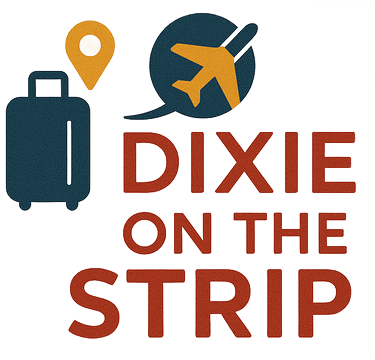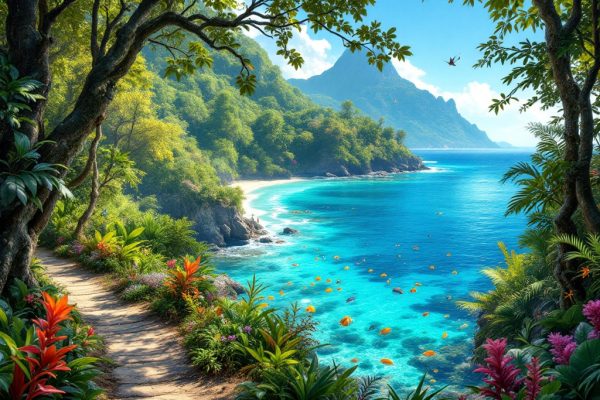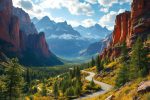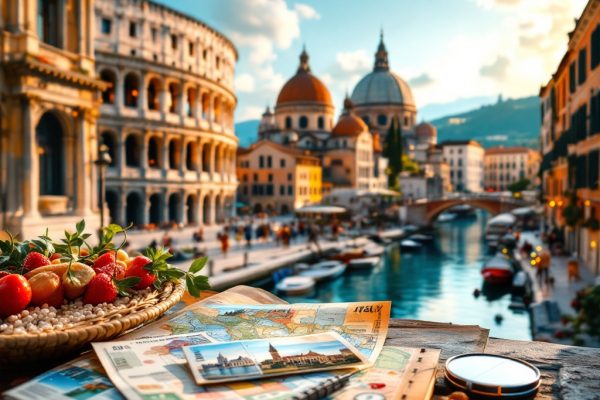Budgeting for a New Zealand Trip: Tips for Saving in Paradise
Dreaming of a New Zealand adventure but worried about the cost? Discover how to explore this breathtaking country on a budget of $80-$100 USD per day! This guide unveils savvy tips for affordable accommodation, transportation, food, and activities, including hostels, hitchhiking, free hiking trails, and cooking your own meals. Learn how to make the most of your money with off-season travel and free national park access. Start planning your unforgettable Kiwi experience today!
Important information

- A daily budget of $80-$100 USD is recommended for travelers to New Zealand.
- Traveling during the shoulder seasons (spring and autumn) offers pleasant weather, fewer crowds, and lower prices.
- Free activities like hiking in national parks, free walking tours, and exploring beaches and swimming spots can significantly reduce costs.
- Budget-friendly accommodation options include hostels, camping, couchsurfing, and WWOOFing (working on organic farms for room and board).
- Save on transportation by utilizing buses, hitchhiking (with safety precautions), or renting a campervan.
Budgeting for a New Zealand Trip: Overview
Planning a trip to New Zealand? A daily budget of $80 to $100 USD is recommended for travelers without local connections. This estimate covers essential expenses such as accommodation, food, activities, and transportation. Careful financial planning will contribute to a more enjoyable and stress-free New Zealand adventure.
Is Traveling in New Zealand Expensive?
Traveling in New Zealand can be costly, but your expenses depend heavily on your travel style. Major contributing factors include accommodation, activities, transportation, and food and beverages. Choosing upscale restaurants will increase your spending, while opting for budget-friendly options can significantly lower your food costs. Careful planning allows you to experience an amazing trip without breaking the bank.
Can You Travel to New Zealand on a Budget?
Traveling on a budget in New Zealand is easier than you think. Here’s how to explore this beautiful country without emptying your wallet:
Accommodation
- Hostels: a budget-friendly social experience.
- Camping: embrace the outdoors and save on accommodation costs.
- Couchsurfing: a unique cultural immersion for budget travelers.
- Campervan rental: flexibility and accommodation all in one.
Transportation
- Public transport: a reliable and affordable option for city and intercity travel.
- Hitchhiking: an adventurous choice, but plan carefully and prioritize safety.
Food
Grocery shopping and cooking your meals is significantly cheaper than eating out. Take advantage of local markets for fresh produce and great deals.
Free Activities
- Hiking: explore New Zealand’s stunning national parks.
- Free walking tours: discover cities like a local.
- Museums: many cities offer free entry to museums.
Managing Your Travel Budget
Planning a trip to New Zealand? Start with a realistic budget. Consider all expenses:
- accommodation,
- transportation,
- meals,
- activities, and
- unexpected emergencies.
Research average costs to create a solid spending plan. Use budgeting apps or spreadsheets to track expenses. Explore cost-effective options like hostels for budget-friendly lodging. Consider public transport and self-catering to reduce food and travel costs. Prioritize free activities like hiking in New Zealand’s stunning national parks. Traveling during the off-season can also save you money. A travel credit card can offer perks, but use it responsibly. With careful planning, you can experience an affordable New Zealand adventure.
Setting a Realistic Daily Budget
A daily budget of $80-100 USD should comfortably cover your expenses in New Zealand. This estimate suits most travelers, but your spending ultimately depends on your travel style. Adventure tours and upscale dining will increase your costs, while free activities and budget accommodations can significantly lower them.
Importance of an Emergency Cushion
Planning for unexpected travel costs is crucial. Setting aside an emergency fund provides a safety net, allowing you to address unforeseen issues. A recommended buffer of 10% of your total budget should be allocated to this fund. For example, if your trip budget is $1,000, allocating $100 for unexpected expenses is advisable. This offers valuable peace of mind. However, depending on the nature of your trip and potential disruptions, such as medical emergencies, a larger buffer might be necessary for enhanced security.
Using a Fee-Free Debit Card
Avoid hefty international transaction fees by using a no-fee debit card. Many banks and credit unions offer debit cards without foreign transaction fees, saving you money on your travels. Inquire with your financial institution to find the right card for your next trip.
Cost-Saving Strategies for Travel Planning
Plan a budget-friendly trip to New Zealand during the spring or autumn shoulder seasons. Enjoy significant savings on accommodations and activities while experiencing breathtaking landscapes without the peak season crowds. The pleasant weather is ideal for outdoor adventures.
Avoiding Peak Travel Seasons
Travel during New Zealand’s shoulder seasons (spring or autumn) to escape the crowds and find better deals. While peak season runs from December to February, the shoulder seasons offer pleasant weather and attractive prices with fewer crowds.
Traveling During Shoulder Season
Escape the crowds and enjoy pleasant weather during the shoulder seasons. These periods offer lower prices on flights and accommodations. You’ll find better deals in the Southern Hemisphere’s spring (September to November) and autumn (March to May). Comfortable temperatures and fewer tourists make these ideal travel times.
Southern Hemisphere Spring (September-November)
- pleasant weather,
- lower prices on flights and accommodations,
- fewer tourists.
Southern Hemisphere Autumn (March-May)
- comfortable temperatures,
- better deals on flights and accommodations,
- fewer tourists.
Accommodation: Affordable Options in New Zealand
Stretch your travel budget in New Zealand with these savvy accommodation options.
Budget-Friendly Stays
- Hostels and dorm beds offer affordable shared accommodation, often including shared kitchens and common areas to further reduce expenses.
Unique & Free Accommodation
- Couchsurfing connects you with locals offering free stays, providing an authentic cultural experience.
- Housesitting offers free lodging in exchange for caring for someone’s home and pets.
- WWOOFing (World Wide Opportunities on Organic Farms) provides free food and accommodation while you volunteer on an organic farm. Learn about sustainable agriculture and enjoy a rewarding cultural exchange.
Choosing Hostels and Dorm Beds
Traveling to New Zealand on a budget? Hostel dorm beds offer the most affordable accommodation, typically costing around $25 USD per night.
Exploring Couchsurfing and Housesitting
Experience New Zealand affordably
Discover unique budget-friendly accommodation options in New Zealand.
- Couchsurfing: Immerse yourself in local culture by staying with New Zealanders for free.
- Housesitting: Enjoy free lodging in exchange for taking care of someone’s home and pets.
Accommodation options comparison
Choose the option that suits your travel style.
- Couchsurfing: Connects you with people, offering opportunities for social interaction.
- Housesitting: Connects you with a place, often providing more privacy.
Both options significantly reduce accommodation costs, enabling you to experience New Zealand without breaking the bank.
WWOOFing for Free Accommodation and Food
WWOOFing (World Wide Opportunities on Organic Farms) offers budget-conscious travelers a unique way to explore the world. By exchanging 4-6 hours of daily work on organic farms, you receive free room and board. This makes it ideal for those watching their wallets. This immersive experience also provides a chance to connect with local culture and learn about sustainable agriculture. With opportunities available throughout New Zealand, WWOOFing allows you to discover the country’s diverse regions and enjoy a variety of enriching experiences.
Transportation: Cost-Effective Ways to Travel
For intercity travel in New Zealand, consider these options:
Bus Travel
Popular bus services like Intercity and Naked Bus offer various money-saving passes and discounts, making them a cost-effective way to explore the country. Check their websites for deals.
Hitchhiking
Hitchhiking is a common and generally safe practice, especially in rural areas. It’s free and provides a unique opportunity to interact with locals. However, prioritize your safety and travel with a companion whenever possible.
Campervan Rental
Combine transport and accommodation costs by renting a campervan. This is an excellent choice for families or groups, offering flexibility and scenic routes. Look for one-way relocation deals for even greater savings.
Bus Travel and Discount Cards
Traveling by bus in New Zealand offers a budget-friendly way to explore the country. It’s a significantly cheaper alternative to renting a car. Discount passes like the InterCity FlexiPass and Naked Bus Pass can lead to even greater savings. Discover New Zealand’s beauty without emptying your wallet.
Hitchhiking: A Common Practice
Hitchhiking is a common and generally safe practice in New Zealand, offering budget travelers a free way to explore the country and save money. It’s a popular choice for backpackers and adventurers seeking an immersive experience. However, it’s essential to prioritize safety and take necessary precautions.
Tips for Safe Hitchhiking
- Travel with a companion whenever possible.
- Inform someone about your plans, including your route and estimated arrival time.
- Choose well-lit and populated areas for hitchhiking, avoiding remote or isolated spots.
- Trust your instincts. If a driver seems suspicious or makes you uncomfortable, politely decline the ride.
- Carry a charged mobile phone for emergencies and communication.
Additional Advice
- Be prepared for varying wait times; hitchhiking can be unpredictable.
- Consider carrying a sign with your destination to make it easier for drivers to spot you.
- Dress in bright, visible clothing to enhance your visibility, especially in low-light conditions.
- Be respectful of drivers’ time and preferences; not all drivers will be willing to pick up hitchhikers.
- Familiarize yourself with local laws and regulations regarding hitchhiking.
Campervan Travel: Saving on Transport and Accommodation
Campervan travel in New Zealand is a perfect choice for budget-conscious adventurers. Combining transport and accommodation, it eliminates the need for separate bookings, saving you money and time. This flexible travel style lets you easily adjust your itinerary and explore diverse locations.
Advantages of campervan travel:
- cost-effective, combining transport and accommodation,
- flexible itinerary, allowing for spontaneous exploration,
- access to various locations, from campgrounds to holiday parks.
Why choose a campervan in New Zealand?
A campervan makes exploring New Zealand both affordable and enjoyable. Experience the freedom of the open road while saving money on hotels and rental cars.
Food Expenses: Eating on a Budget
Saving money on food in New Zealand is easy when you cook at home. Local supermarkets like Countdown, New World, and Pak’nSave offer great deals. Cooking at home helps you control portions and reduce food waste. Buy in bulk when possible, check weekly specials, and choose seasonal produce to save even more. Farmers’ markets are another excellent option for fresh, affordable, locally sourced food. Picnics are a fun and budget-friendly way to enjoy New Zealand’s beautiful scenery.
Smart Shopping Strategies
- Compare prices at different supermarkets.
- Use loyalty cards for extra discounts.
- Plan your meals to avoid impulse buys.
Affordable Dining Options
- Explore local markets like the Otago Farmers Market in Dunedin or the Hawke’s Bay Farmers’ Market in Hastings for lower prices on local goods.
- Consider food trucks and casual eateries as alternatives to expensive restaurants.
- Look for lunch specials, early-bird discounts, and happy hour deals.
Cooking Your Own Meals vs. Eating Out
Dining out in New Zealand can quickly drain your funds. If your lodging includes a kitchen, preparing your own meals offers significant savings. Self-catering helps keep your travel budget in check, especially since supermarket prices are far lower than restaurant menus. Cooking your own food is a smart financial move. You’ll save on both food and transportation costs.
Grocery Shopping Tips
Grocery shopping in New Zealand is a great way for travelers to save money. Eating in is much cheaper than eating out, giving you more control over your meals and dietary needs. New Zealand supermarkets offer a wide variety of products, making it easy to maintain any special diet. Save money and enjoy your trip by visiting a local supermarket.
Money-Saving Tips for Activities
Experience the magic of New Zealand without breaking the bank. Explore the stunning national parks through free hiking trails, immersing yourself in the country’s natural beauty. Join free walking tours in cities like Auckland and Queenstown, discovering hidden gems and local stories. Cool off with a refreshing dip at the numerous free beaches and swimming spots. Wander through local markets and charming small towns, uncovering unique, budget-friendly adventures.
Embrace Nature’s Wonders
- Explore stunning national parks through hiking trails,
- Discover free beaches and swimming spots for a refreshing dip,
- Wander through local markets and charming small towns.
Urban Adventures
- Join free walking tours in cities like Auckland and Queenstown,
- Discover hidden gems and local stories,
- Uncover unique, budget-friendly adventures.
Enjoying Free Activities in National Parks
Discover New Zealand’s breathtaking national parks, all free to explore. Hike through native forests, marvel at stunning views, and experience the diverse beauty of this country without paying any entrance fees.
Fiordland National Park
Explore stunning fjords and immerse yourself in the tranquility of this natural wonder.
Tongariro National Park
Discover dramatic volcanic landscapes and challenge yourself with scenic hikes.
Abel Tasman National Park
Relax on golden beaches, kayak in turquoise waters, and soak up the coastal charm.
Other National Parks
These are just a few examples of the many national parks waiting to be explored. Discover your perfect adventure.
While park access is always free, some specific activities like guided tours may have associated costs. Start planning your unforgettable New Zealand adventure today.
Hiking: A Free Adventure
Discover New Zealand’s stunning landscapes without breaking the bank. Explore the country’s numerous free hiking trails, offering diverse scenery for all skill levels. From the Tongariro Alpine Crossing to Abel Tasman National Park, find the perfect hike for you.
Creating an Itinerary: Balancing Cost and Adventure
Planning a trip to New Zealand? Be sure to consider both islands, as the North and South offer distinctly different experiences. Balancing cost and adventure will be an important part of your planning.
North Island
Experience the geothermal wonders and rich Maori culture.
South Island
Explore stunning fjords and abundant adventure activities.
Transportation is key to exploring both islands. Research ferries, buses, and flights to find the best options for your budget and time constraints.
Adventure Activities
- Bungy jumping.
- Skydiving.
Budget-Friendly Options
- Hiking.
- Kayaking.
- Exploring free national parks.
These options offer a fantastic way to connect with nature while saving money.
Exploring the North Island and South Island
New Zealand’s North Island pulsates with geothermal wonders and vibrant cities like Auckland and Wellington. Rotorua offers a rich immersion in Maori culture.
The South Island boasts dramatic landscapes, from the towering Southern Alps and deep fjords to ancient glaciers. Adventure seekers gravitate to Queenstown, the adrenaline capital.
Prioritize your must-see destinations on each island, keeping your interests and budget in mind.
If you’re visiting both islands, remember to include ferry costs.
Explore free activities like hiking, visiting national parks, and browsing local markets to stretch your budget further.
Adventure Activities: Budgeting for Thrill
Embrace the outdoors! It’s incredibly beneficial for your well-being. Many outdoor activities, such as hiking, swimming, and exploring the beach, are often completely free of charge. Your local visitor center can be a valuable resource, providing information on no-cost activities and events happening in your area. Explore free museums and art galleries, or discover breathtaking scenic viewpoints. Connecting with local communities can also unlock a world of budget-friendly adventures, including free community events that offer an authentic taste of the local culture. Many communities offer free concerts, festivals, and other events that allow you to immerse yourself in the local culture without spending a dime.















